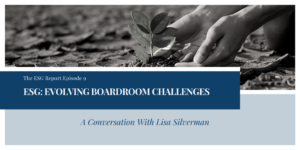
Lisa Silverman is the Senior managing director at K2 Integrity, and she joins Tom Fox on the ESG Report to talk about the evolving boardroom challenges that companies are seeing in the United States and around the world. They touch on the changes in representation in boards, how social issues are becoming more important, and accountability in the public eye.
Diversity in the Boardroom
Tom and Lisa talk about the California law passed in 2018 mandating more and different kinds of diversity on boards. Other states soon followed, and investment organizations are agreeing that higher levels of diversity are an imperative. Lisa points out that historically most boards have been white males who sat on multiple boards. She has very much enjoyed seeing boardrooms starting to look different and loves that boards who don’t have diverse membership are going to have to justify why.
Due Diligence and Vetting of Board Candidates
Good stewardship used to mean that you worked for a while, had moved on, and were now a person of leisure, and you could bring a certain gravitas to a board. With increased responsibilities and more active roles, board membership deserves and is receiving a much higher level of scrutiny. The availability of information means that there are no excuses for failing to bring on people who can be good stewards.
The Impact of Social Issues
Tom brings the conversation around to the S part of ESG, and asks Lisa what she is seeing in terms of shareholder activity as a result of the social changes that have happened in the last few years. She talks about the wildly high percentage of women and people of color who had been added to boards in 2021 – there has been a meteoric rise in board diversity. This isn’t necessarily translating to equity, but it is something to be paying attention to. She talks about the shock of the January 6th insurrection, and how that caused investors and companies to respond.
Engine #1
Lisa and Tom talk about the changes in the Exxon board, why alternative board members were presented and ultimately voted in, and start to dig into why corporations make the kinds of decisions they do – especially when stock price is falling. Lisa says that some of the change is rooted in the types of activism we’ve seen over the last 4 decades. She points out that when she listens to people who disagree with her, the work they are doing together tends to be better. This is true for people and companies.
Stakeholders vs Shareholders
“When we’re talking about a shareholder, we’re talking about someone who has an equity interest in a company. It is a thing that one can buy and sell and is traded on the exchange.” Lisa explains. “Stakeholders are anybody who has an interest in the company, it can be customers, employers, bondholders, the suppliers – a much larger group of people.” Often shareholder actions can negatively impact other stakeholders. She goes on to talk about how the UK is handling these sometimes conflicting priorities, and what is different about the US response. Tom adds that the different groups can be quite fluid, and the power of social media in communicating these issues.
Accountability
Tom wonders who a company is accountable to, and he gives the example of two companies who had workforce walk-offs as a result of management behavior, and what happened to these companies in the public eye as a result. Lisa talks about how the lines of acceptability have shifted, and companies need to be asking themselves if things really used to be okay, or we just acted as if they were. There are very strong whistleblower protections in this company – because there are companies and individuals within them who behave badly.
Resources
K2 Integrity
Lisa Silverman at K2 Integrity


